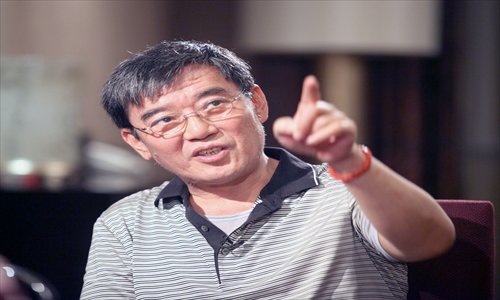Man of a thousand faces
Few Chinese people will have trouble remembering Lee Li-chun's face when he appears on our television and cinema screens. And yet, as he admits himself, many people still struggle to put a name to his recognizable features. What's for certain is that this winner of a Taiwanese television Golden Bell award (1981) and a Canada Quebec Film Festival Exhibition award (1996) has never stopped working in his long career.
During a lecture at KIC Auditorium in Shanghai last Saturday, this actor and former cross talk performer spoke about his prolific career, while giving his own unique perspectives on theater, film and television. And a number of articles that Lee has written for a performing arts magazine in Taiwan over the past four years have now been collated into a book called Lee Li-chun's Life Scenery which has recently been published by Fudan University Press.
"Acting requires a lot of self-control. Don't become smug because of a good performance, and draw lessons from your bad acting experiences," he said.

Bond with performing
Born in 1952 in Taiwan, this is Lee's 40th year in show business. Before becoming an actor at the age of 27, Lee worked as a sailor for about eight months. Lee's father, who was a military officer from the Chinese mainland, hoped Lee would get a well-paying job, rather than following him into the army.
"However, life at sea wasn't exactly healthy, and it kept me away from my family for a long time. I couldn't face doing it my whole life, so I quit," he said.
The first time Lee got the acting "bug" was when he joined a newly-established student drama troupe while in his second year at a maritime affairs technical college. Many of the troupe's dramas were highly praised by professional theater staff and television companies.
After ending his short maritime career, Lee tried a number of jobs including selling car parts, being a cake store deliveryman and being a driver for a massage parlor. On hearing that a television production company was looking for actors, Lee jumped at the chance.
In 1981, Lee won the Golden Bell best actor award for his role in a television drama, and from then on he was a regular comic performer in numerous restaurants and nightclubs around Taipei. He recalls that most of his life from the age of 29 to 32 seemed to be spent on a motorcycle shuttling between different venues every night.
"It was an economically prosperous time in Taiwan, and I performed more than 2,000 shows in restaurants and nightclubs," he said. "Many other well-known performers were reluctant to perform in such places. However, I wanted to practice and improve my act, and I felt it was extremely challenging to grab the attention of people as they were eating."

Stage career
A highlight of Lee's career was founding the famous Taiwan troupe, Performance Workshop, together with Stan Lai and Hugh K. S. Lee. To revive the fast-disappearing traditional performance art of cross talk in Taiwan, they created their own cross talk performance called The Night We Became Hsiang-Sheng Comedians. In 1985, it proved to be a huge success in Taiwan. "The tickets for extra performances even sold out within hours," recalled Lee.
Lee also has fond memories of their second project, Secret Love in The Peach Blossom Land. The story idea was inspired by Lee's personal experiences in his student troupe, particularly the time the troupe once came into conflict with another music troupe over the use of a venue.
This show was directed by Stan Lai, and has been restaged with different casts many times in the years since. In the original version, Lee played the part of Laotao, and it remains one of his most well-regarded classical stage roles.
Having performed in more than 40 dramas, he believes performing gives him energy. But he said he has no plans to perform live on the Chinese mainland.

Life on television
Lee has become a household name in his native Taiwan mostly for his cross talk talents, stage work and films including Papa, Can You Hear Me Sing? (1983). While on the Chinese mainland, he has also become well-known for his roles in television series, among them, The 28 Housekeepers in Professor Tian's Household (1998).
"I have acted in more than 3,000 television episodes of various shows," he said. "The roles have been very different because I don't want to typecast myself." He said he thinks that the role of Professor Tian (in the aforementioned series) is the character that most resembles himself.
"When portraying a confident character, I try to find his weakness, or a more 'normal' side to him which will make him seem more lifelike and believable; and if it's an unsympathetic character, I will try to dig out his redeeming qualities," Lee said.
"Don't be too picky about roles," has remained Lee's working principle. "And there is no exact criterion of what is good or not. In my heart, the only important thing is to perform with my whole being. I present a role to the audience in the same way I would serve a delicious meal," he said.
Although Lee considers many television series to be no more than the entertainment equivalent of "fast food," he has no plans to stop working soon. He has appeared in television series on the Chinese mainland for 17 years. His major motivation, he admits, is financial; not hard to understand when he is responsible for the welfare of his family in Canada where he now lives.
"Every year I also go back to appear on stage in Taiwan, to compensate for the energy I've expended in television series!" he said.